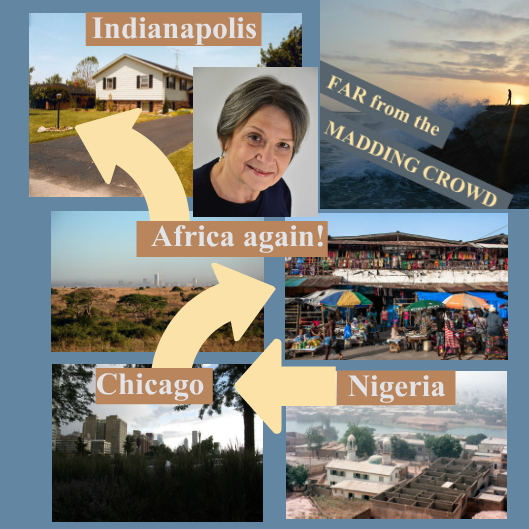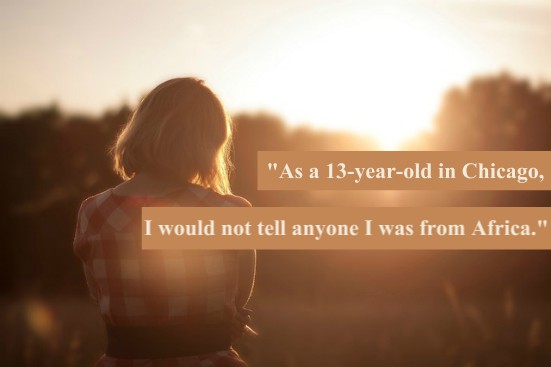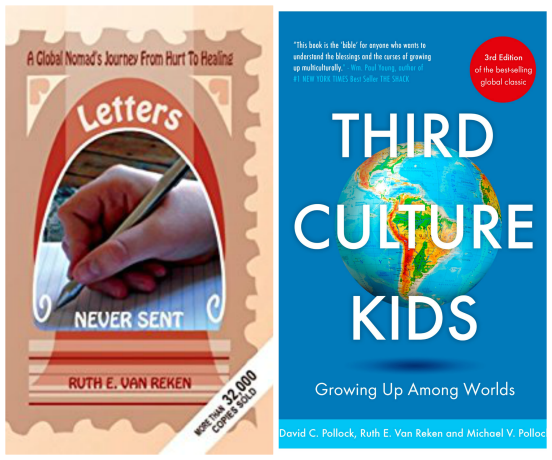
Columnist Doreen Brett is back, and she’s accompanied by someone whose “homes” have ranged from Africa to the American Midwest, and who knows better than any of us here what it means to feel culturally displaced. Hm, who else could it be other than the indomitable Ruth Van Reken? —ML Awanohara
Hello Displaced Nationers! It is my pleasure to present to you Ruth Van Reken, an expert in cross-cultural identity and globally mobile families. She is renowned internationally for her compassion, knowledge and insight into what it means to be a child growing up among worlds, otherwise known as a Third Culture Kid.
An American, Ruth was born in Kano, Nigeria, to missionary parents. Although her mom was raised in Chicago, being a TCK is a tradition on the paternal side of her family: her father, too, was a TCK (he was born in Rasht, Iran, then known as Persia, where his parents lived). It’s a tradition Ruth has continued: both her children and first grandchild are TCKs.
Among her many accomplishments, Ruth is co-founder and past chairperson of Families in Global Transition (FIGT), a forum for globally mobile individuals, families, and those working with them, the signature event being an annual conference. She is also the co-author, with David Pollock, of the now-classic Third Culture Kids: Growing Up Among Worlds, soon to be out in its third edition.
Ruth often speaks about issues related to the global lifestyle and has developed the website Cross Cultural Kids as a hub for children of refugees, immigrants, minorities, career expatriates, mixed race, and bicultural families. The way she sees it, not just TCKs but all children who have experienced a globalized upbringing or some form of displacement from their parents’ home/culture are forming a “new normal” in today’s globalizing world.
Now let’s hear about Ruth’s own experiences of living in various locations abroad—and how those locations have fed her creative life.
* * *
Ruth, I understand you’ve just celebrated your 72nd birthday. Happy birthday! And welcome to the Displaced Nation. As I mentioned just now, you were born and grew up in Nigeria. What I didn’t mention is that you lived in Liberia and Kenya as an adult, with your husband and family. How did you come to spend so much of your life in Africa?
Spending 13 years of my childhood in Nigeria was the result of my parents deciding to accept a teaching job in that country. Later, when I got married, my husband and I chose to live and work in Liberia—he as a pediatrician, and me as a nurse. It didn’t go quite to plan. I didn’t end up doing nursing because they were trying to use Liberians for nursing, and we couldn’t get visas to visit my parents in Nigeria even though I had grown up there and loved the country. It was postwar, and all the Nigerians cared about is that I had an American passport. When I finally got to visit my parents, it was a journey of clarification for me. Nigeria wasn’t my world. There had been big changes politically. There were soldiers in the airport. I still really loved the country but could see it wasn’t mine. Later we moved to Kenya.
Would you say it’s normal to live in this way?
For some of us, for whom the seeds are planted early, it’s normal to live like this. Some may think that it’s radical, or how would you dare. But for me it’s the way life is, and it’s good. My hardest move was from Kenya to my current home of Indianapolis, when I thought my travels are over! I’ve come to enjoy where I live right now, but at the time, I thought the international lifestyle was missing. Everybody’s lived here forever and is the same.
How did you keep from feeling isolated through your many moves?
Feeling isolated? I’m an EE (Extreme Extrovert)! There are always people, as long as you don’t demand that they have to be just like you. My hobby is that I like to talk, and I also like to go out, even if it’s to shop for groceries in a little mud hut someplace. So I never felt isolated. Africa is a very social environment. It’s warm all year. In Kenya I joined an International Women’s Club. We had a group of 17 women of 14 different nationalities meeting together every week.
Many of us expats or people who’ve grown up as Third Culture Kids gravitate towards global cities as that’s where we think we’ll find work and our “tribe.” Has that been your experience?
Chicago is quite a global city now, but it was very different when I first moved back home, pre-immigration days. My family lived in a neighborhood where everyone was segregated into traditional communities. That’s why, when I came back as a 13-year-old, everybody was from there and white, and although I looked like I should fit, I didn’t. That was a bad year for me. After one year, I did the chameleon thing and pretended to blend in. I would not tell anyone I was from Africa.

What about when you moved your own family back to the United States?
When my husband and I moved back to Indianapolis, we chose the suburbs as we were specifically looking at schools for the kids. I saw one school and thought, “Everyone looks the same. My kids won’t fit in here.” We found a school where the kids had many looks—a school with multi-nationalities and multi-backgrounds. I felt our kids are going to fit in here better, they have more space to be themselves. You know, somebody here once said: “You think you know everything and you’re so proud because you’ve been everywhere.” I was shocked and horrified. I told her:
“If I just try to be the suburban housewife, then I have a place. But if I ever let you know who I am, then I have no place.”
How did your life in Kenya compare to this?
Kenya was easier for me. When we were sitting with the other expats, we would often be talking about who we are and where they’ve been. That conversation was acceptable for that group. I realized that I don’t understand my neighbor’s job in tech, and he doesn’t understand mine, but we can be great friends on a million other subjects. You can make a bridge of the human story. The more stories we share, the more we connect in those spaces of humanity. In time, I found my space.
I know from reading your books that you think TCKs have special gifts.
I think the biggest gift of being a TCK is that I can connect, and I am sure you do too, to the humanity in people who don’t look like me, and who are from different backgrounds. We can connect with different cultures in some ways. We understand how much the human heart wants to belong.
Can you give us a concrete illustration of a work of yours that was nurtured out of the places you have lived in?
Although my parents were teachers for local schools, they sent me to an international boarding school when I was six years old, as was the norm, so I would learn American history and culture and be prepared for repatriation. I was there for three years, and after that I spent a year in the United States with my gran. Finally, my mother asked if I would like to be home schooled, so from fourth grade onwards, she taught me lessons in her classrooms in the Nigerian schools. I was able to connect to my family, I had Nigerian friends, I learnt the language and played games with them. Years later, when my husband and I had been in Liberia for some time, my daughter wanted to go to boarding school because all her friends were going there. I got depressed, with unresolved grief from my childhood. That was a discovery for me, of the impact of transition on my life. I started writing letters to my parents as if I were six years old again. These then became my memoir, Letters I Never Sent: A Global Nomad’s Journey from Hurt to Healing. Here’s an excerpt:
May 1958. “Today we’re leaving Africa… It’s unbearable to think that I may never again see my home or closest friends or the country that I love so much. It’s sort of like a death—to lose your whole world in one moment.”
Readers responded that they’d felt this way too. This was when I first heard of “TCK”. My first book wasn’t a conscious choice. My second book, Third Culture Kids: Growing Up Among Worlds, which I co-wrote with David Pollock, was bigger than me and my story. I traveled to 50 different countries for the TCK work.

And let me tell you about my home here in Indianapolis. When I first arrived, my life in boxes, I put up some African things on the walls. My daughter’s friend took it all down, and said you’re in America now. But my bookcase still has musical instruments from all around the world. Every culture makes music through four ways—percussion, string, wind, and brass. These are the same four ways to make music all over the world. This display, too, is a creative expression of my life.
You still live in Indianapolis. Does that city feed your creativity as well?
With immigration, I realized the world was coming to Indianapolis, but people here weren’t attuned to it (for example, in human resources and schools). I started seminars here, and with the help of some friends with organizational skills, my efforts grew into Families in Global Transitions (FIGT).
What’s next for you, travel-wise and creativity-wise: will you stay put where you are or are other cities/artistic activities on your horizon?
On September 8th, we will be releasing the third edition of Third Culture Kids, with more stories and more diversity of TCKs. My interest is in the innumerable ways people are growing up cross-culturally now. I think a lot of Cross-Cultural Kids (CCKs) feel lost and aren’t feeling internally where they belong. Human beings need a place to fit, we need to find new ways to name identity so people can belong in positive ways. They should be able to say: Given the reality of my life, I can accept where I’ve come from instead of trying to fix what’s different about me.
Do you have any parting advice for your fellow ATCKs?
Come for the next Families in Global Transitions (FIGT). I think we find our tribe there. You don’t have to explain yourselves to the group. And whatever project you’re working on, that book, that website, there’s an empowerment to go back and continue and finish the writing, finish the project.
Ruth, your story resonates with me in so many ways! Thank you for sharing it.
* * *
Readers, any further questions for the amazing Ruth Van Reken on her thoughts about place, displacement, and the connection between the communities you’ve lived in and creativity? Any authors or other international creatives you’d like to see Doreen interview in future posts? Please leave your suggestions in the comments.
STAY TUNED for this coming week’s fab posts.
If you enjoyed this post, we invite you to register for The Displaced Dispatch, a biweekly round up of posts from The Displaced Nation—and so much more! Register for The Displaced Dispatch by clicking here!
Related posts:
Photo credits:
Opening collage: 245 Kano City Nigeria 1995, by David Holt via Flickr (CC BY-SA 2.0); Chicago Skyline from Grant Park, Chicago, Illinois, by Ken Lund via Flickr (CC BY-SA 2.0); Waterside Stores (Monrovia, Liberia), by Mark Fischer via Flickr (CC BY-SA 2.0); 774 Redbud Lane (Greenwood, Indiana), by Bart Everson via Flickr (CC BY 2.0); photo of Kenya via Pixabay and photo of Ruth supplied.
Photo of girl via Pixabay.
Book covers supplied.











